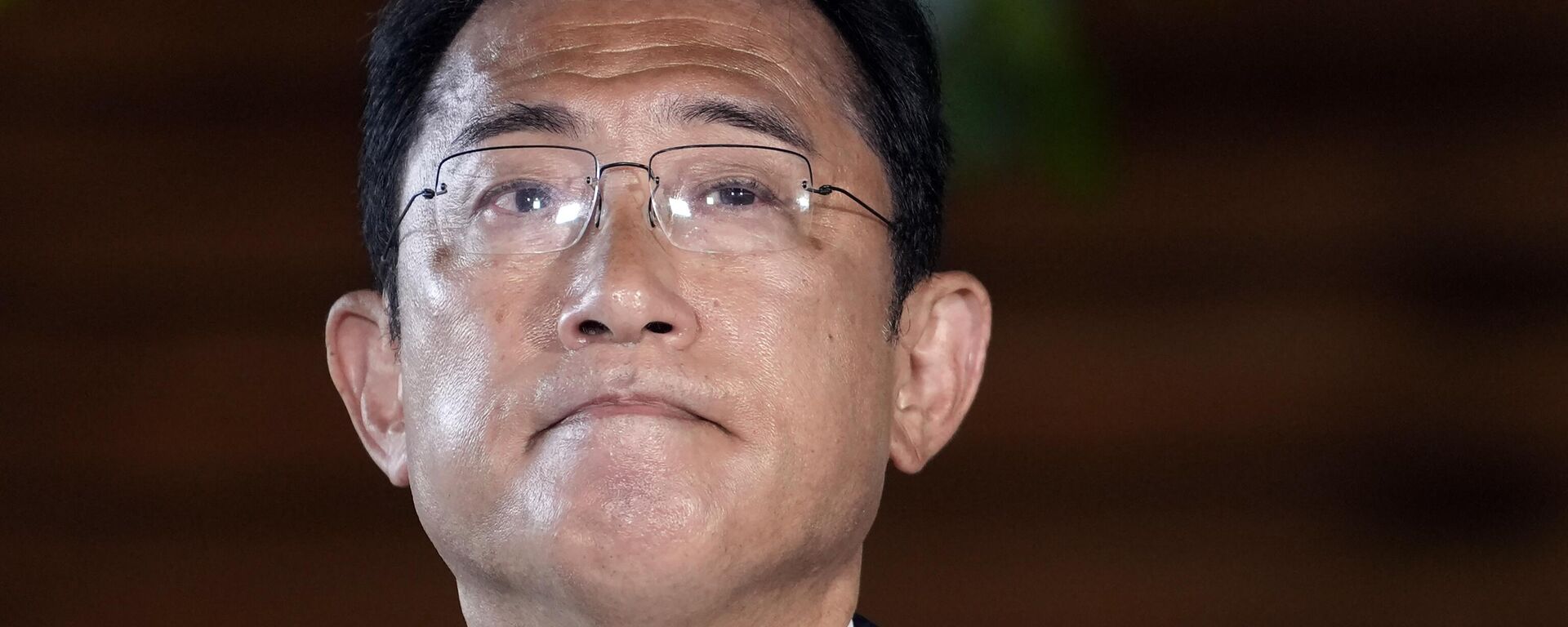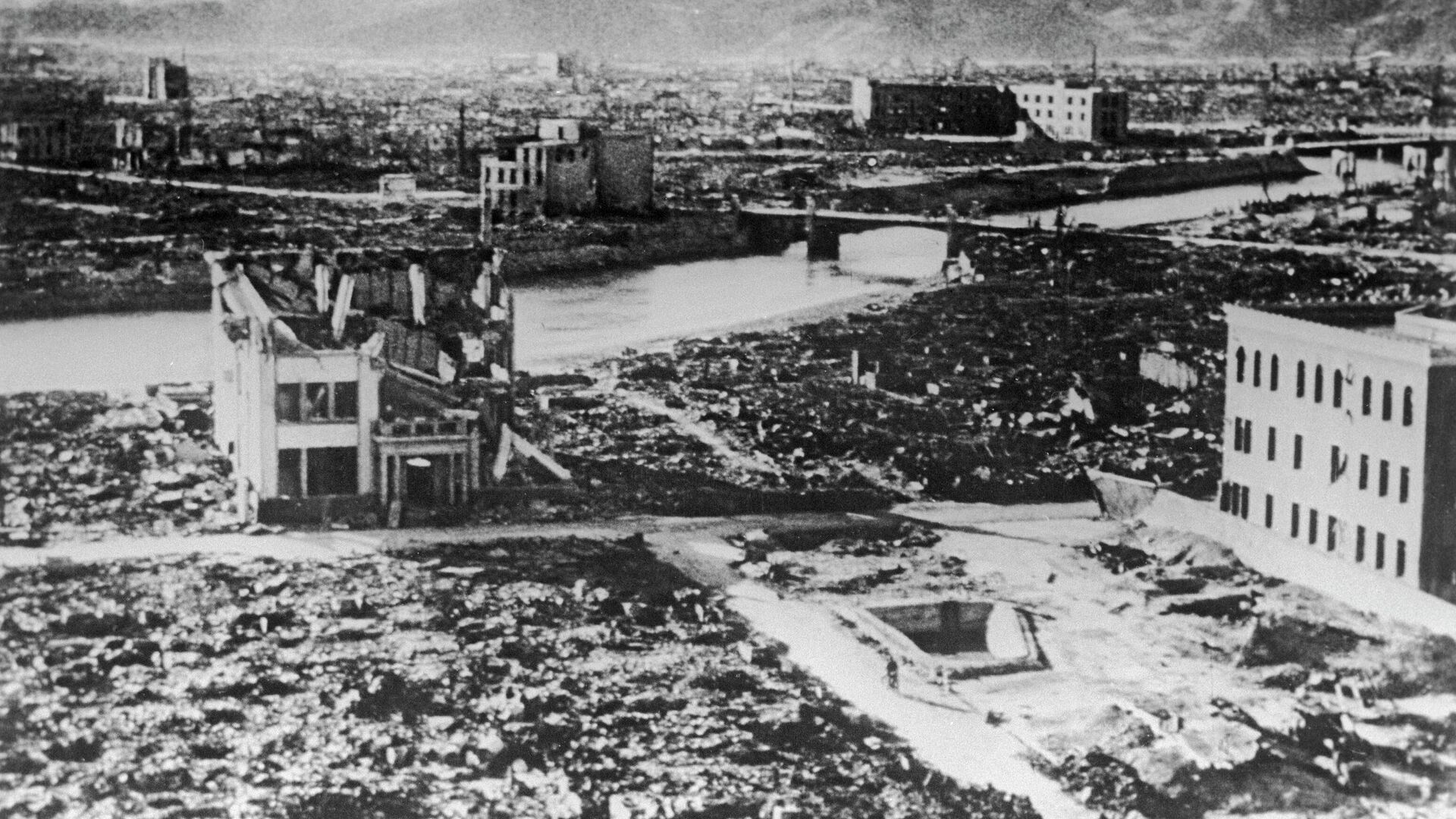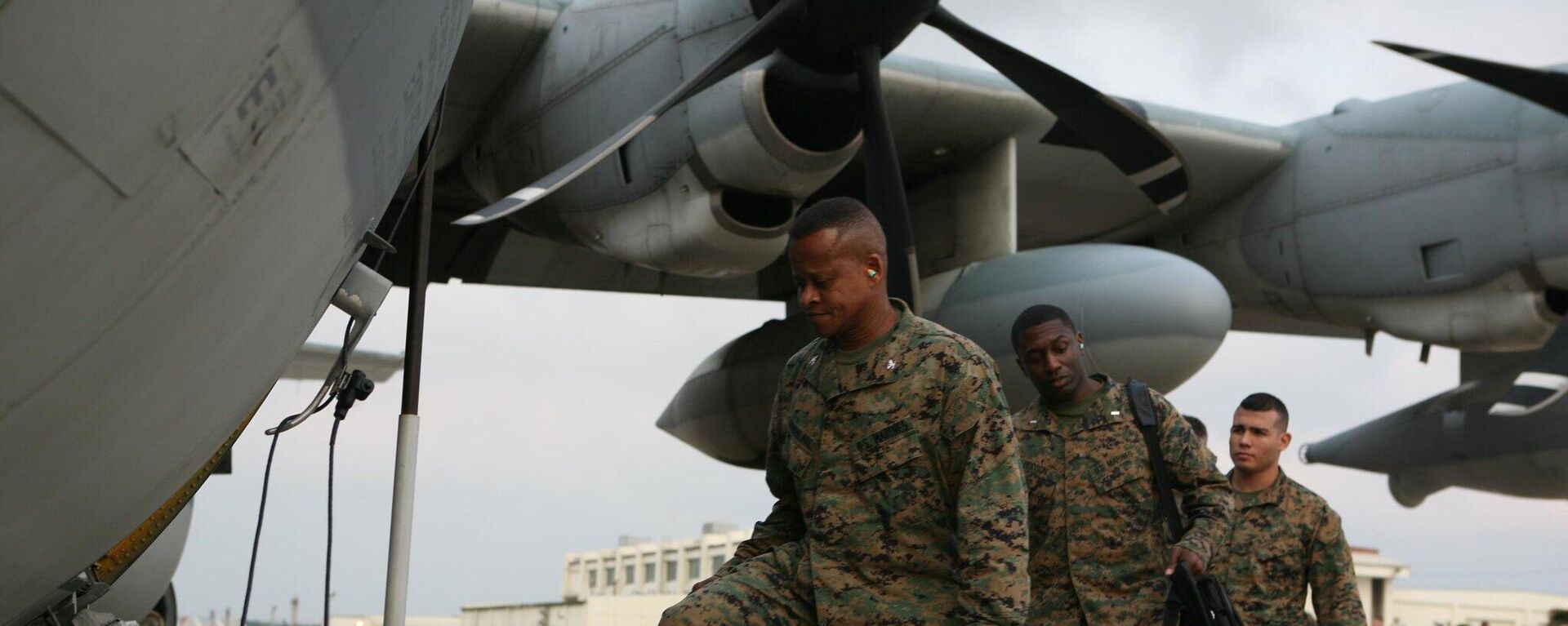https://sputnikglobe.com/20240816/japan-marks-79th-anniversary-of-a-bomb-but-fast-tracks-to-become-third-largest-military-spender-1119787225.html
Japan Marks 79th Anniversary of A-Bomb, But Fast Tracks to Become Third Largest Military Spender
Japan Marks 79th Anniversary of A-Bomb, But Fast Tracks to Become Third Largest Military Spender
Sputnik International
One of these historians is Dr. Peter Kuznick, who joined Sputnik’s The Critical Hour to discuss the use of the atomic bomb in World War II.
2024-08-16T05:30+0000
2024-08-16T05:30+0000
2024-08-16T05:30+0000
analysis
japan
china
world war ii
us atomic bombings
atomic bomb
hiroshima
nagasaki
ussr
japanese liberal democratic party
https://cdn1.img.sputnikglobe.com/img/07e7/08/06/1112415761_0:153:3097:1895_1920x0_80_0_0_ef5dbfd27ad610b7c71ca993161d33bf.jpg
On the morning of August 6th, 1945, the Japanese city of Hiroshima was destroyed by the first atomic bomb to be used as a weapon of war, according to the Imperial War Museums. Within the first four days of the blast, roughly 120,000 people died as a result of American bombing. While some were vaporized in an instant, others suffered from their wounds or radiation. Just three days later, a second atomic bomb was used to devastate the city of Nagasaki where an estimated 73,000 people were killed by an American bomb.The West has often referred to the attack as the "Atomic bomb that was responsible for ending World War II". But some historians believe the deaths of hundreds of thousands civilians was unnecessary, and argue that the Japanese were already prepared to surrender. One of these historians is Dr. Peter Kuznick, who joined Sputnik’s The Critical Hour to discuss the use of the atomic bomb in World War II.“...at Yalta in February of ‘45, Stalin promised Roosevelt that the Soviets would be in the Pacific War three months after the end of the war in Europe,” he added. “They knew the Japanese were defeated. We'd been intercepting the Japanese cables. We broke the codes early in the war. We knew what they were saying, that the only obstacle to surrender is the US demand for a complete surrender.”On August 14 the Japanese accepted the demand of unconditional surrender, however it was not until September 2nd that the final Japanese surrender was signed. But the analyst suggested that the notion that the atomic bomb ended the war is nonsense.The Soviets joined the war in early August, the analyst explains, which is when the Japanese “really knew that the war was over”. It was not the use of the atomic bomb that influenced the Japanese to surrender, but the Soviets decision to join the war, the analyst argued.US Secretary of Defense Lloyd Austin told a group of security officials on Saturday that war with China is “neither imminent nor unavoidable”, a US news source reported. Austin’s comments followed a meeting he had with Chinese Defense Minister Dong Jun in what was the first in-person meeting between the defense officials following US House Speaker Nancy Pelosi’s visit to the Chinese island of Taiwan.China condemned Pelosi's visit as a move by the US to support Taiwanese separatism. Following a meeting in July, the US and Japan announced the strengthening of their military ties as well as reinforcing the US Forces Japan to a warfighting command, Sputnik reported. This week, Japanese Prime Minister Fumio Kishida announced his plans to step down as leader of Japan’s ruling Liberal Democratic Party (LDP). As an ally to the US, the prime minister was responsible for militarizing Japan - in fact, Japan is on track to becoming the world’s third-largest military spender after the US and China. But he could not overcome sinking approval ratings which followed a corruption scandal surrounding the LDP, as well as rising living costs and a weakening yen, Sputnik reported.
https://sputnikglobe.com/20240731/okinawa-on-fire-division-brewing-in-japan-over-us-militarizing--nuclearizing-1119579206.html
https://sputnikglobe.com/20240815/they-need-a-scapegoat-us-favored-japanese-leader-to-step-down-1119775163.html
japan
china
hiroshima
Sputnik International
feedback@sputniknews.com
+74956456601
MIA „Rossiya Segodnya“
2024
News
en_EN
Sputnik International
feedback@sputniknews.com
+74956456601
MIA „Rossiya Segodnya“
Sputnik International
feedback@sputniknews.com
+74956456601
MIA „Rossiya Segodnya“
american atomic bomb, nuclear explosion, atomic explosion, atomic war, nuclear war, japan-us relations, japan-us alliance, wwii, atomic bomb, russia saved the world, ussr in wwii, ussr won the war, american bombings, nuclear bombings
american atomic bomb, nuclear explosion, atomic explosion, atomic war, nuclear war, japan-us relations, japan-us alliance, wwii, atomic bomb, russia saved the world, ussr in wwii, ussr won the war, american bombings, nuclear bombings
Japan Marks 79th Anniversary of A-Bomb, But Fast Tracks to Become Third Largest Military Spender
This month, Nagasaki marks the 79th anniversary of the devastating atomic bomb attack in World War II by the United States. Hiroshima marked the anniversary as well, with Mayor Kazumi Matsui encouraging the world to not be resigned to pessimism as continued global conflicts have given rise to fears of nuclear war.
On the morning of August 6th, 1945, the Japanese city of
Hiroshima was destroyed by the first atomic bomb to be used as a weapon of war, according to the
Imperial War Museums. Within the first four days of the blast, roughly 120,000 people died as a result of American bombing. While some were vaporized in an instant, others suffered from their wounds or radiation. Just three days later, a second atomic bomb was used to devastate the city of Nagasaki where an estimated 73,000 people were killed by an American bomb.
The West has often referred to the attack as the "Atomic bomb that was responsible for ending World War II". But some historians believe the deaths of hundreds of thousands civilians was unnecessary, and argue that the Japanese were already prepared to surrender. One of these historians is Dr. Peter Kuznick, who joined
Sputnik’s The Critical Hour to discuss the use of the atomic bomb in World War II.
“The Japanese were not only close to surrendering, they were desperate to surrender. In early February 1945, former Prime Minister Prince Konoe wrote to the emperor and said, I'm sorry to inform you, but defeat is inevitable. They knew that,” Kuznick explains.
“Really, after the Battle of Saipan in July of 1944, the Japanese knew that they could not win militarily,” he continued. “By May, they were issuing reports effectively saying that intervention by the Soviets into the war would mean the absolute defeat of Japan. American intelligence knew that. Starting in April, the Joint Intelligence Committee, the Joint Chiefs of Staff, were saying effectively that as soon as the Soviets intervene, the war is effectively over.”
“...at Yalta in February of ‘45, Stalin promised Roosevelt that the Soviets would be in the Pacific War three months after the end of the war in Europe,” he added. “They knew the Japanese were defeated. We'd been intercepting the Japanese cables. We broke the codes early in the war. We knew what they were saying, that the only obstacle to surrender is the US demand for a complete surrender.”
“And so, there were two ways to get them to end the war sooner without use of the atomic bomb. But the sad reality is the US wanted to use the atomic bomb. And they wanted to use it to send a signal to the Soviet Union that if they interfered with US plans in Europe or the Pacific, they were going to get this and worse.”
On August 14 the Japanese accepted the demand of unconditional surrender, however it was not until September 2nd that the final Japanese surrender was signed. But the analyst suggested that the notion that the atomic bomb ended the war is nonsense.
“The atomic bombings were horrible and unnecessarily killed hundreds of thousands of people. But that's not what changed the war. The Japanese had known that the US had firebombed more than 100 Japanese cities already. Destruction reached 99.5% in the city of Toyama. Japanese leaders accepted that the US could wipe out their cities. What they dreaded, and we know this from all the documents, what they dreaded was the Soviet entry into the war.”
The Soviets joined the war in early August, the analyst explains, which is when the Japanese “really knew that the war was over”. It was not the use of the atomic bomb that influenced the Japanese to surrender, but the Soviets decision to join the war, the analyst argued.
“It was all about the Soviet invasion, which is what US intelligence had been predicting for months and months anyway,” he added. “But the lessons that the Americans learned was that the invasion was necessary and humane because it saved a half million American lives as well as millions of Japanese and other Asian lives."
US Secretary of Defense Lloyd Austin told a group of security officials on Saturday that war with China is “neither imminent nor unavoidable”, a US news source reported. Austin’s comments followed a meeting he had with Chinese Defense Minister Dong Jun in what was the first in-person meeting between the defense officials following US House Speaker Nancy Pelosi’s visit to the Chinese island of Taiwan. China condemned Pelosi's visit as a move by the US to support Taiwanese separatism. Following a meeting in July, the US and Japan announced the strengthening of their military ties as well as reinforcing the US Forces Japan to a warfighting command, Sputnik reported.
“I think there are lessons across the board. The Japanese have forgotten all the lessons that they learned. Japan embraced Article 9 of the peace constitution during the US occupation. Now that's been effectively thrown out the window. Japan is remilitarizing,” Kuznick explained.
“Japan's self-defense forces, they're called, are now offensive forces that are committed to coming to the US defense if fighting breaks out over Taiwan,” he added. “The US has been militarizing the region, effectively preparing for war. Not that it wants war, because the Pentagon has conducted 18 war games between the US and China over Taiwan. And China has prevailed in all 18.”
This week,
Japanese Prime Minister Fumio Kishida announced his plans to step down as leader of Japan’s ruling Liberal Democratic Party (LDP). As an ally to the US, the prime minister was responsible for militarizing Japan - in fact,
Japan is on track to becoming the world’s third-largest military spender after the US and China. But he could not overcome sinking approval ratings which followed a corruption scandal surrounding the LDP, as well as rising living costs and a weakening yen,
Sputnik reported.

15 August 2024, 05:05 GMT




